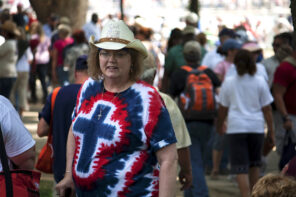Anyone wanting to get to the real meat of the new Pew survey showing, for the first time, a Protestant minority in the U.S. (48%) should go directly to RD senior editor Sarah Posner’s fine Guardian article and skip this one.
Sarah writes persuasively that while creaky Protestant panjandrums will still push cultural warfare in league with equally senescent Catholic hierarchs (via their nefarious new “religious freedom” axis), the more interesting and welcome news relates to what is happening among the 18-29 year-old set: the millennials. Here, white evangelicals make up only 13% of the total cohort, compared to 32% who are now religiously unaffiliated. Of these younger “nones,” 42% say they are atheist or agnostic. The others obviously aren’t all that keen on organized religion, or else they would affiliate.
Does this mean, Sarah asks, that we might see these younger Americans pushing back against religious encroachment and religious pandering by our politicians? Might there even be a “secularist revival” aimed at reestablishing church-state separation?
From Sarah’s lips to God’s ears, I say. Read the rest for the likely politics of Protestants in decline.
My job here is more Spenglerian. I worry about what Corey Robin calls the strong reactionary potential within the narrative of loss that already animates conservative discourse. I worry about how twisted ideas about special election intertwine with white supremacist ideas when God’s special people (white Protestants) feel themselves threatened by demographic change.
But I also worry about something else. The “White Protestants in Decline” banner flying over the Pew findings includes the story about fading conservative-evangelical juice, but it also includes a different story about the fading of mainline Protestantism and the declining influence of mainline clergy. This is no cause for rejoicing, at least to me.
This is in part because the mainliners comprise a cohort that strongly supports church-state separation of the kind Sarah longs for. With some exceptions, they have not been afraid of science or of applying critical thought to all inherited beliefs: they believe in education, not indoctrination. In recent years the mainliners have been migrating toward progressive positions across a range of issues. Scholar David Hollinger has traced the longer trajectory of mainline Protestant achievement in the civic space.
There’s no help for it, I realize, but for almost everyone today the term “white Protestant” leader evokes images of clownish figures like Falwell, Robertson, and Dobson. I’m old enough to remember when the term would have evoked images of Reinhold Niebuhr, Eugene Carson Blake, Paul Moore Jr., William Sloane Coffin, even Paul Tillich. All of them DWEMs, I realize, but all of them also extraordinary small-‘d’ democrats. Sic transit gloria mundi.




